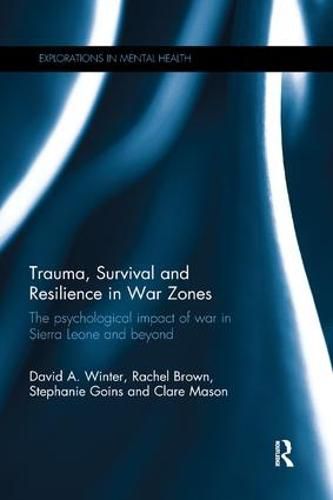Readings Newsletter
Become a Readings Member to make your shopping experience even easier.
Sign in or sign up for free!
You’re not far away from qualifying for FREE standard shipping within Australia
You’ve qualified for FREE standard shipping within Australia
The cart is loading…






This book, based upon a series of psychological research studies, examines Sierra Leone as a case study of a constructivist and narrative perspective on psychological responses to warfare, telling the stories of a range of survivors of the civil war. The authors explore previous research on psychological responses to warfare while providing background information on the Sierra Leone civil war and its context.
Chapters consider particular groups of survivors, including former child soldiers, as well as amputee footballers, mental health service users and providers, and refugees. Implications of the themes emerging from this research are considered with respect to how new understandings can inform current models of trauma and work with its survivors. Amongst the issues concerned will be post-traumatic stress and post-traumatic growth; resilience; mental health service provision; perpetration of atrocities; and forgiveness. The book also provides a critical consideration of the appropriateness of the use of Western concepts and methods in an African context.
Drawing upon psychological theory and rich narrative research, Trauma, Survival and Resilience in War Zones will appeal to researchers and academics in the field of clinical psychology, as well as those studying post-war conflict zones.
$9.00 standard shipping within Australia
FREE standard shipping within Australia for orders over $100.00
Express & International shipping calculated at checkout
This book, based upon a series of psychological research studies, examines Sierra Leone as a case study of a constructivist and narrative perspective on psychological responses to warfare, telling the stories of a range of survivors of the civil war. The authors explore previous research on psychological responses to warfare while providing background information on the Sierra Leone civil war and its context.
Chapters consider particular groups of survivors, including former child soldiers, as well as amputee footballers, mental health service users and providers, and refugees. Implications of the themes emerging from this research are considered with respect to how new understandings can inform current models of trauma and work with its survivors. Amongst the issues concerned will be post-traumatic stress and post-traumatic growth; resilience; mental health service provision; perpetration of atrocities; and forgiveness. The book also provides a critical consideration of the appropriateness of the use of Western concepts and methods in an African context.
Drawing upon psychological theory and rich narrative research, Trauma, Survival and Resilience in War Zones will appeal to researchers and academics in the field of clinical psychology, as well as those studying post-war conflict zones.